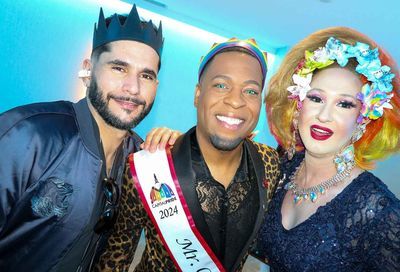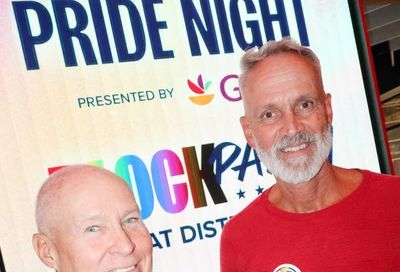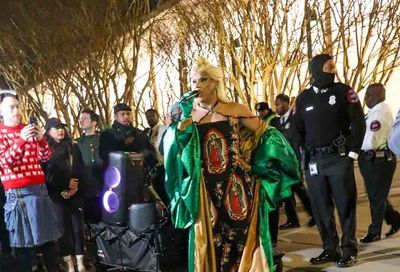Gay Jewish Sperm Donor Says Lesbian Couple Rejected Him Over Gaza War
Jay Lazarus says he won't be swayed from donating to other couples despite being rejected for his Jewish identity and support of Israel.

An Australian hairdresser who had agreed to donate sperm to a lesbian couple trying to conceive says that he’s been the victim of anti-Semitism after being rejected by the pair due to his Jewish identity.
Jay Lazarus, of Perth, who describes himself a South African-born, Australian-raised gay Jewish man, claims the lesbian couple sent him a text last month informing him that they no longer wanted to conceive using his sperm due to their discomfort with the ongoing conflict in Gaza.
Lazarus told The New York Post that he had always wanted to donate sperm to help infertile couples conceive and joined a Facebook group helping couples find sperm donors.
Through that group, he became aware of a lesbian couple in Queensland and was touched by their personal story. So he offered to help.
The 37-year-old underwent months of genetic testing, medical tests, and in-person counseling sessions with his partner. He also became close with the couple, regularly keeping in contact through texts, phone calls, and Zoom chats.
Lazarus says the couple knew he was Jewish from the start of the process and were extremely open to his involvement in the child’s life. He said he was happy to be an “uncle” to the child. In September 2023, he donated his sperm, which was frozen for three months while more testing was done.
On October 7, the Iranian-backed terrorist organization Hamas, which controls Gaza, attacked several Israeli military bases, civilian communities, and a music festival, killing 766 civilians, including 71 foreign nationals, and 373 members of Israel security forces.
Hamas fighters also took hundreds of hostages and committed several sexual assaults in the process. In the days following the attack, Lazarus shared Instagram posts supporting Israel — but none criticized the Palestinian people.
The lesbian couple that Lazarus was assisting made no mention of the pro-Israel posts, nor did they directly comment on them.
Then, last month, the couple texted Lazarus, expressing “deep gratitude” and acknowledging that he had been “absolutely amazing through out this entire journey.” They also said they didn’t feel comfortable using his sperm to conceive because they were “deeply affected” by the “war between Israel and Gaza.”
“We are down a rabbit hole with the depth of our emotions and the ethical challenges,” the text read, in part. “And truth be told we feel out of our depth proceeding.” They added that they are “about love and kindness,” but don’t feel they have “the capacity to navigate parts of your identity in this donor relationship, so we are respectfully ending this now.”
Many left-wing individuals — particularly in the West — see the conflict in Gaza as a struggle between Jewish people and Palestinians, with the nation of Israel serving as a colonizing force exerting power over an indigenous people, likening it to the struggles of Aborigines in Australia, Blacks in South Africa, and Native Americans in the United States.
However, the analogy doesn’t hold when speaking about Israel, where the majority of Jewish people are Mizrahi or Sephardi, meaning they are descended from Jews who were forced out of their previous countries of residence as part of a backlash by Arab and North African governments after Israel emerged victorious in the 1948 Arab-Israeli war.
Nonetheless, some left-wing individuals have used their interpretations of the conflict to justify anti-Jewish rhetoric or attitudes, failing to make the distinction between the Israeli government and the Jewish people.
Still others have expressed anger at Jewish people, Israel, and even Western governments over the lack of a ceasefire, which proponents claim would enable aid agencies to enter Gaza and respond to humanitarian crises there. But opponents of a ceasefire have said that agreeing to one will only help keep Hamas in power — eliminating any hope of a lasting peace in the region — and will encourage other terrorist groups to engage in similar actions to get their way in the future.
It remains unclear what specific issues in the ongoing conflict led to the lesbian couple’s upset and ultimate decision to sever ties with Lazarus.
After being rejected, Lazarus held off for several weeks before sharing his story on his Instagram account.
“Prejudice is still persuasive, even in progressive circles that champion ‘kindness and love,'” the would-be sperm donor wrote in a post. “Antisemitism is not just a relic of the past but a living, breathing prejudice that continues today. This couple has chosen a path, and while I can’t change their view, I refuse to let it diminish my pride or lose hope. I’m proud to be gay, proud to be Jewish, and proud to stand against hate.”
The Instagram post has received more than 8,300 likes since going live on January 9. Lazarus told the New York Post that he has received numerous supportive comments and no negative comments.
“It’s been incredible actually,” he said of the response his post has received, adding he’s been “blown away” by the positive reception.
He also noted that he hass received another message from the lesbian couple, but has not opened it yet.
Lazarus, who got married in December, hasn’t given up on sperm donation. He’s currently in talks with another couple who recently suffered a miscarriage but will try to conceive again in March.
Support Metro Weekly’s Journalism
These are challenging times for news organizations. And yet it’s crucial we stay active and provide vital resources and information to both our local readers and the world. So won’t you please take a moment and consider supporting Metro Weekly with a membership? For as little as $5 a month, you can help ensure Metro Weekly magazine and MetroWeekly.com remain free, viable resources as we provide the best, most diverse, culturally-resonant LGBTQ coverage in both the D.C. region and around the world. Memberships come with exclusive perks and discounts, your own personal digital delivery of each week’s magazine (and an archive), access to our Member's Lounge when it launches this fall, and exclusive members-only items like Metro Weekly Membership Mugs and Tote Bags! Check out all our membership levels here and please join us today!
























You must be logged in to post a comment.